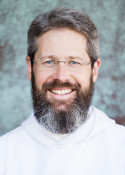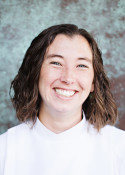From the Rector
Eating, Together
In the past week, like most people, I have been a part of more conversations than I can count about this past presidential election. The conversations have been with people who have voted for a variety of candidates and for whom this election has spawned myriad responses.
Some of the responses are deeply disconcerting: acts of violence, threats of harm, the denial of another’s humanity. Other responses are dispiriting—it has been a long time since I remember hearing so many people talk openly (sometimes through veiled humor) about using drugs (alcohol, pharmaceutical, and others) to be able to sleep, to numb their feelings, and/or to alter their state. There are also those who are responding through acts of compassion, searches for new information, and ways to find solidarity with others. Sometimes your response might vary from day to day or hour to hour.
What I have unexpectedly found to be a consistent sub-current to many of these conversations hasn’t been about policy or prospective cabinet members. Of all things, it has been about Thanksgiving.
I suppose, then, that it isn’t surprising to read a couple of articles yesterday and today in the New York Times about that meal a week from today, one about the political splits within families, and another about how to argue without rancor.
Someone from outside of our country might wonder, why? Why are such deep-seated feelings coming up now? It seems to me that Thanksgiving, like the Fourth of July, is a holiday emblematic of American cultural tradition. It serves as a quasi-historical and symbolical notion of our national culture. Which is why it can be so challenging to engage. Especially together.
At a time when people’s perceptions of what it means to be an American and what this nation stands for are so polarized, coming together with people with whom you may share genetics, but little else, has many in a state of dread. You may not have talked with your aunt or cousin or brother for years about “politics,” and yet for many this year, it feels unavoidable. And really hard.
In this way, it’s as if Thanksgiving serves as both a fraught date on the calendar and a metaphor for us. The reality is that for many, we will be around a table laden with meaning, perhaps sitting between people with whom we fundamentally disagree. And, at the same time, we find ourselves in a country of deeply held convictions, after a bruising election cycle, facing an uncertain future.
One of the quotes that caught my eye in the article about political splits within families was by Misty Bastian, 61, an anthropologist at Franklin & Marshall College. She talks about a cousin who, “put a post on Facebook that she described as ‘all about Trump triumphalism.’ She felt that the post was directed at her and that its message was: ‘You’re a liberal elitist and I don’t have to pretend now that I have to listen to you.’”
That is a sense I have gotten from many people on both sides, that we no longer have to listen to each other. As you may have heard or read in my sermons and reflections for the past month, I have grave concern for this impulse and find the Way of Jesus to be calling us towards real conversation rather than the ways of isolation.
I realize that this can be very difficult. Depending on the family dynamics that preceded this election, these kinds of conversations can be taxing, and call for all the courage we can muster. But, to paraphrase Jeremiah, if we are to seek the welfare of the city where we find ourselves, then these kinds of conversations are vital.
In the article about talking without rancor, scholar Dr. George Yancy offers this teaching, “‘This is a moment when we are not just talking past each other, but against each other. So for me, the condition for a conversation has to be that you are unafraid to speak courageously, and you are unafraid to tell your partner exactly what it is that you think about the world.’ But a two-way argument also requires fearless listening, ‘even if it is me talking to a white supremacist who is trying to tell me that I am inferior,’ he added. ‘One of the conditions for the possibility of a fruitful argument is to allow for some kind of opening up in myself to hear.’”
We cannot expect that one conversation or one meal will change hearts and minds. The work of listening and responding is work with a long arc. But if the alternative is to remove ourselves or to remove others from the table because we believe the divide to be too great, then we place ourselves, our families, and our country at great risk.
It is no accident that Jesus shared tables with all kinds of people—those who disagreed with him, and those who were not even supposed to be at the table. And, from our Gospel accounts, it is clear to me that some fierce conversations took place at those meals. My prayer is that even this Thanksgiving, especially this Thanksgiving, as we open our homes to family and friends, to kin and stranger, we are courageous enough to open our hearts as well.
Peace,
Phil+
From the Associate Rector
Simple Steps to Welcoming
This last week has left many of us wondering what to do: how to live in solidarity, how to respond to oppression, how to hold onto hope. Some of the work ahead will be sweeping, some ideas seem like quick fixes, and much of the way forward remains unclear.
What is clear, though, is that we hold the priority of standing with those who are vulnerable. This fall I’ve been in conversation with a number of folks about how to help guide All Souls towards being more welcoming and supportive of people who identify as transgender or non-binary. I was confident that we could do better: that we could be more informed and more proactive.
This work, at its core, is grounded in our unwavering belief that the body of Christ is diverse and good, and that every member is needed for us to be whole together. What’s more, we are called to live authentically with one another – which means we need to work harder to welcome all people fully as themselves. I’m reminded of the wonderful story in the Acts of the Apostles when Philip meets an Ethiopian eunuch, an example of gender diversity. After studying scripture together, the eunuch is deeply moved, and exclaims, “Look, here is water! What is to prevent me from being baptized?” The answer: nothing. Phil baptizes him right then and there, immediately welcoming him into the Body of Christ.
One simple but very important way we want to do a better job of offering this kind of immediate welcome at All Souls is by normalizing sharing and asking for people’s preferred gender pronouns. Asher O’Callaghan, Extraordinary Lutheran Ministries Program Director, explains it this way: “Even though we’re used to operating on assumptions about how people identify based on how they look, our assumptions often turn out to be inaccurate. And giving people the opportunity to ask for how they’d like to be referred to can make a big difference in helping someone feel welcomed, seen, and affirmed.” For folks who are cisgender, that is to say people whose gender identity is the same as the sex they were assigned at birth, pronouns may seem obvious. Probably many have never given it much thought — this is a form of privilege, and a helpful one to examine.
Because pronouns matter tremendously to people who identify as transgender or non-binary, here’s a quick crash course. Pronouns are the words that we use to refer to someone in place of their name. They are words like: she, her, hers, they, them, theirs, he, him, and his. As many people have come to understand the gender binary of male/female as being too narrow to adequately reflect their identity, some people have begun using they/them/theirs as individual pronouns. It can be confusing at times, since we’re most accustomed to using they/them/theirs to refer to a group of people, but with some practice it can become second nature. To be fully welcoming, we need to use the pronouns that an individual prefers, rather than assuming that we know how they identify. This resource may be helpful for you to learn about gender identity terms in more depth.
The next steps we are going to embrace at All Souls are to include our preferred pronouns when we introduce ourselves in small groups and to offer the option of adding pronouns to our name tags. These are simple, quick actions to take, but the more cisgender allies that do them, the more safety and welcome we can create for our trans friends who are misgendered all too often. You can request a new nametag with your pronouns by signing up on the clipboard in the narthex, or by filling out this google form – it will take just 10 seconds! You can also just grab a marker and add pronouns to your name tag before the next round is printed.
Asher O’Callaghan offers these helpful tips for allies:
+ Pay attention to the ways you use highly gendered phrases like “sir”, “ma’am”, “ladies and gentlemen”, “brothers and sisters”. If you’re not actually sure of how the people you’re talking to identify, it’s better not to use these types of phrases.
+ If you don’t know what pronouns someone uses, feel free to ask: let them know what pronouns you prefer and ask them what they prefer.
+ If it doesn’t seem like an appropriate or safe space to ask someone what pronouns they prefer directly, you can always just substitute a person’s actual name or title until you have a chance to ask them.
Thanks for taking the steps to learn, act, and make this community more welcoming for all people!
Peace,
Liz+
she/her/hers
From the Presiding Bishop
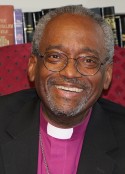 Episcopal Church Presiding Bishop and Primate Michael B. Curry has issued the following statement:
Episcopal Church Presiding Bishop and Primate Michael B. Curry has issued the following statement:
Last week I shared what I pray was a reconciling post-election message to our church, reminding us that ‘we will all live together as fellow Americans, as citizens.’ Today I want to remind us that during moments of transition, during moments of tension, it is important to affirm our core identity and values as followers of Jesus in the Episcopal Anglican way.
Jesus once declared, in the language of the Hebrew prophets, that God’s “house shall be a house of prayer for all nations” (Mk 11:17). He invited and welcomed all who would follow saying, “come to me all who are weary and are carrying heavy burdens” (Mt. 11:28).
We therefore assert and we believe that “the Episcopal Church welcomes you” – all of you, not as merely a church slogan, but as a reflection of what we believe Jesus teaches us and at the core of the movement he began in the first century. The Episcopal Church welcomes all. All of us!
As the Episcopal branch of the Jesus Movement today, we Episcopalians are committed, as our Prayer Book teaches to honor the covenant and promises we made in Holy Baptism: To proclaim by word and example the Good News of God in Christ; To seek and serve Christ in all persons, loving our neighbor as ourselves; to strive for justice and peace among all people, and to respect the dignity of every human being.
As Christians, we believe that all humans are created in God’s image and equal before God – those who may be rejoicing as well as those who may be in sorrow.
As a Church, seeking to follow the way of Jesus, who taught us, “you shall love your neighbor as yourself,” (Mt. 22:39) and to “do to others as you would have them do to you” (Mt. 7:12), we maintain our longstanding commitment to support and welcome refugees and immigrants, and to stand with those who live in our midst without documentation. We reaffirm that like all people LGBT persons are entitled to full civil rights and protection under the law. We reaffirm and renew the principles of inclusion and the protection of the civil rights of all persons with disabilities. We commit to the honor and dignity of women and speak out against sexual or gender-based violence. We express solidarity with and honor the Indigenous Peoples of the world. We affirm the right to freedom of religious expression and vibrant presence of different religious communities, especially our Muslim sisters and brothers. We acknowledge our responsibility in stewardship of creation and all that God has given into our hands. We do so because God is the Creator. We are all God’s children, created equally in God’s image. And if we are God’s children we are all brothers and sisters.
“The Episcopal Church Welcomes You,” is not just a slogan, it’s who we seek to be and the witness we seek to make, following the way of Jesus.
Presiding Bishop and Primate Michael B. Curry
The Episcopal Church
MAJOR DETOURS THIS SUNDAY MORNING!!
 This Sunday, November 20th, is the Berkeley Half Marathon. The good news is that many All Solesians will be out racing together! In addition, many of our regular routes to church will be more complicated because of the road closures. Emily Hansen Curran is preaching at All Souls for the first time this Sunday, so make sure you plan ahead to make it in time!
This Sunday, November 20th, is the Berkeley Half Marathon. The good news is that many All Solesians will be out racing together! In addition, many of our regular routes to church will be more complicated because of the road closures. Emily Hansen Curran is preaching at All Souls for the first time this Sunday, so make sure you plan ahead to make it in time!
Here are directions for how to make your way to church with ease from any direction. Most of them should be smooth, but it would be wise to give yourself an extra 10-15 minutes in case you hit other race day traffic. A full map of closures is available here. Folks coming to the 7:30 service shouldn’t be affected.
From the North:
Your best bet is to stay north of Marin, avoid the circle, and climb all the way up to Spruce. Figure in an extra 10 minutes.
Details:
Off of 80, take the Buchanan St. exit.
Continue up Marin
Left on Peralta
Right on Thousand Oaks
Left on Arlington
Right on Santa Barbara
Left on Northampton
Right on Spruce, and cruise on down to All Souls!
From South Berkeley:
Stay south of Channing, take Ashby up to Piedmont, looping above campus. Figure in an extra 10 minutes.
Details:
Staying south of Channing, go to Ashby.
Take Ashby east
Turn left on College
Turn right on Dwight
Turn left on Piedmont, continue onto Gayley
Continue straight onto La Loma
Turn left onto Le Conte
Turn right on Euclid
Turn left on Cedar, and cruise on down to All Souls!
From the East and South
Take Tunnel Road to Claremont, stay above campus. Figure in an extra 10 minutes.
Details:
Take 24 to Tunnel Road
Continue onto Ashby
Turn right on Claremont
Turn left on Derby
Turn right on Warring
Continue onto Piedmont, then continue onto Gayley
Continue straight onto La Loma
Turn left onto Le Conte
Turn right on Euclid
Turn left on Cedar, and cruise on down to All Souls!
From the West:
Get off at Ashby, and loop above campus. Figure in an extra 10 minutes.
Details:
From 80, take the Ashby exit
Continue east on Ashby
Turn left on College
Turn right on Dwight
Turn left on Piedmont, continue onto Gayley
Continue straight onto La Loma
Turn left onto Le Conte
Turn right on Euclid
Turn left on Cedar, and cruise on down to All Souls!
From Central Berkeley
[South of Marin, Santa Fe and Page, East of 4th Street, North of Bancroft/Channing, and West of Shattuck/Telegraph]To get to the 9am service, your best bet is to take side streets (avoid University!) and park on the west side of the race course, near the corner of Cedar & Shattuck and then walk the couple of blocks up to All Souls. Bonus points if you see an All Solesian running while you cross Shattuck!If you need a ride up from the east side of Shattuck, let Liz or Emily know and we’ll arrange for someone to pick you up there.
You may get lucky crossing Shattuck at University and then continuing to Oxford, though it will likely be quite slow as they let cars across intermittently. University should be fully open at Shattuck after 9:45 am.
Family Friendly Advent Festival
November 27, 4:00 pm
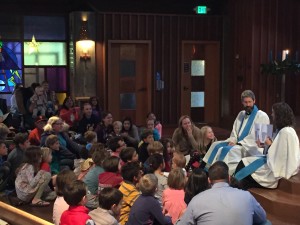 It’s time to get ready! Come at 4:00 pm next Sunday for a short service of carols, poems, and a kids’ story. Then stay to make Advent wreaths, ornaments, and Cards of Hope with Braid Mission for foster youth. We’ll eat cookies, sip hot cider and mulled wine, and sing around a fire in the courtyard. Bring your first batch of Christmas cookies and cider or wine to share, and invite friends! This is an easy time for new folks to find their way into church. Yes, it takes a lot of energy to go to church in the morning and come back again, but Advent is such a short season – you’ll be glad you came, or your money back.
It’s time to get ready! Come at 4:00 pm next Sunday for a short service of carols, poems, and a kids’ story. Then stay to make Advent wreaths, ornaments, and Cards of Hope with Braid Mission for foster youth. We’ll eat cookies, sip hot cider and mulled wine, and sing around a fire in the courtyard. Bring your first batch of Christmas cookies and cider or wine to share, and invite friends! This is an easy time for new folks to find their way into church. Yes, it takes a lot of energy to go to church in the morning and come back again, but Advent is such a short season – you’ll be glad you came, or your money back.
Christmas Pageant
Sign up by November 23!
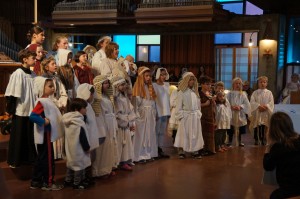 The time has come! The pageant is at the heart of our 4pm service on Christmas Eve. We don’t enact the nativity story each year just because it’s fun and heartwarming. More importantly, we do it because our kids learn the story of God coming among us more deeply when they enter into it with their bodies and their own voices. Please talk with your kids this week about what roles they would like to play and list their top three choices here by next Wednesday, November 23. We also need adults to help shepherd the process. If you can volunteer for rehearsals, costume help, or staging on Christmas Eve, let Liz know!
The time has come! The pageant is at the heart of our 4pm service on Christmas Eve. We don’t enact the nativity story each year just because it’s fun and heartwarming. More importantly, we do it because our kids learn the story of God coming among us more deeply when they enter into it with their bodies and their own voices. Please talk with your kids this week about what roles they would like to play and list their top three choices here by next Wednesday, November 23. We also need adults to help shepherd the process. If you can volunteer for rehearsals, costume help, or staging on Christmas Eve, let Liz know!
What’s happening with the Parish House?
Vestry and committee members would like to provide information, answer questions and listen to input from parishioners about the progress of plans for the Parish House. Please join us immediately following the last service, at roughly 12:30 pm on Sunday November 20th or on Tuesday, November 22nd, at 7:00 pm in the church.
NOMINATIONS FOR VESTRY
Four new Vestry members will be elected at the parish annual meeting on January 29th. The Nominating Committee welcomes your recommendations of persons for this form of service and leadership in the community. Information about vestry qualifications and expectations, together with the form for submitting suggestions, is on the counters in the narthex. Please give this thought and prayer and make your suggestions by December 4. (Committee members: Madeline Feeley, Thomas Burcham, Kim Wong, Marilyn Flood)
GIVE THANKS WITH US
Looking for a way to give thanks to God at the end of this month? Join All Soulsians for Holy Eucharist Thanksgiving morning, November 24th at 10:00 am here in the church.
Save the date for Camp All Souls: August 7-11!
Looking way ahead, mark your calendars for August 7 – 11, 2017! Next summer we will be embarking on a new adventure: we are going to offer our own tailor-made, home-grown day camp right here at All Souls! More information will be forthcoming, but you can count on it being loads of fun, with lots of hands-on excitement, deepening fellowship in community, and an excellent grounding in progressive theology and formation. The camp will be for kids ages 5-11, with opportunity for teens to serve as counselors-in-training.




